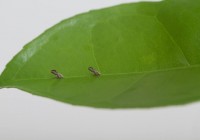5
abr
An army of 1 million wasps categories: Fundecitrus, Greening
Fundecitrus, a research organization maintained in partnership with citrus growers and industry, surpassed the mark of 1 million wasps released in Brazilian groves. The insect, called Tamarixia radiata, is part of a strategy that uses biological control to fight Citrus Greening (HLB). The wasp is a natural enemy of the psyllid, the mosquito that transmits the bacteria which causes the disease. The wasps were released on 734 properties, covering 4789 hectares.
Developed in Fundecitrus’ Biological Control laboratory, the Tamarixia radiata uses the psyllid’s nymphs to reproduce themselves, killing them in the process. Each one can eliminate up to 500 nymphs. The release into the environment doesn’t cause ecological imbalance, since the wasp doesn’t affect other species of insect or plants. “Fundecitrus’ goal is to contribute to a sustainable management of HLB, providing natural means of reducing the population of psyllids and therefore reducing the need for spraying in groves”, says biologist Ana Carolina Pires Veiga, responsible for the laboratory.
The wasps are released in areas with citrus and myrtles which have no chemical control, such as abandoned orchards, urban spaces, farms and ranches. The locations are determined by Fundecitrus’ Phytosanitary Alert system, a program developed in collaboration with citrus growers throughout the State of São Paulo and Triângulo Mineiro, where the Brazilian production of oranges, which monitors the psyllid population, is concentrated.
The wasps biofactory was inaugurated in March 2015, it is installed in a 342m² area and has the capacity to produce up to 100 thousand units per month.
For more information on the laboratory check the link: http://www.fundecitrus.com.br/pesquisa/controle_biologico
- |

